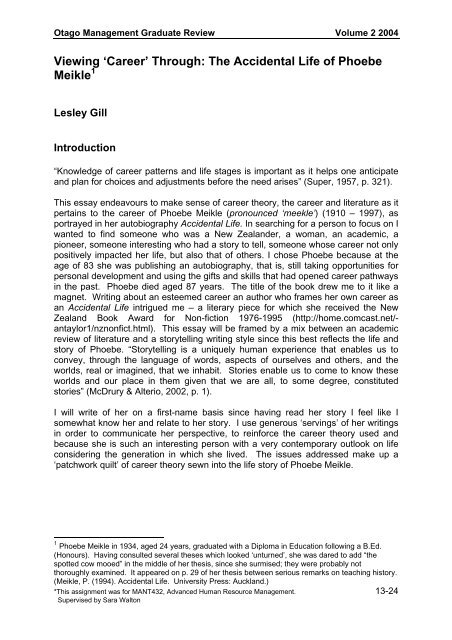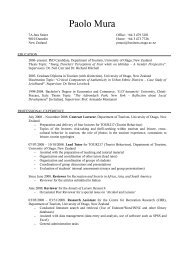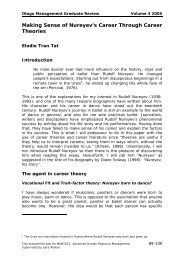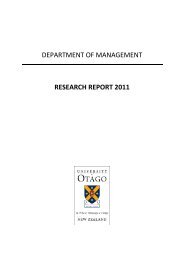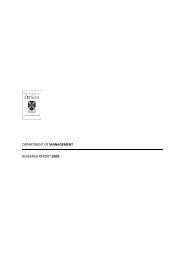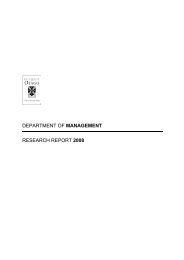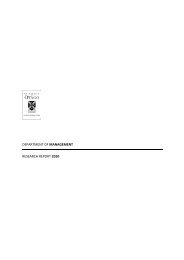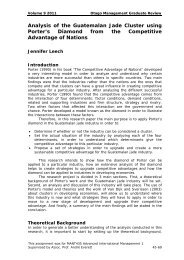Viewing 'Career' Through: The Accidental Life of Phoebe Meikle
Viewing 'Career' Through: The Accidental Life of Phoebe Meikle
Viewing 'Career' Through: The Accidental Life of Phoebe Meikle
Create successful ePaper yourself
Turn your PDF publications into a flip-book with our unique Google optimized e-Paper software.
Otago Management Graduate Review Volume 2 2004<br />
<strong>Viewing</strong> ‘Career’ <strong>Through</strong>: <strong>The</strong> <strong>Accidental</strong> <strong>Life</strong> <strong>of</strong> <strong>Phoebe</strong><br />
<strong>Meikle</strong> 1<br />
Lesley Gill<br />
Introduction<br />
“Knowledge <strong>of</strong> career patterns and life stages is important as it helps one anticipate<br />
and plan for choices and adjustments before the need arises” (Super, 1957, p. 321).<br />
This essay endeavours to make sense <strong>of</strong> career theory, the career and literature as it<br />
pertains to the career <strong>of</strong> <strong>Phoebe</strong> <strong>Meikle</strong> (pronounced ‘meekle’) (1910 – 1997), as<br />
portrayed in her autobiography <strong>Accidental</strong> <strong>Life</strong>. In searching for a person to focus on I<br />
wanted to find someone who was a New Zealander, a woman, an academic, a<br />
pioneer, someone interesting who had a story to tell, someone whose career not only<br />
positively impacted her life, but also that <strong>of</strong> others. I chose <strong>Phoebe</strong> because at the<br />
age <strong>of</strong> 83 she was publishing an autobiography, that is, still taking opportunities for<br />
personal development and using the gifts and skills that had opened career pathways<br />
in the past. <strong>Phoebe</strong> died aged 87 years. <strong>The</strong> title <strong>of</strong> the book drew me to it like a<br />
magnet. Writing about an esteemed career an author who frames her own career as<br />
an <strong>Accidental</strong> <strong>Life</strong> intrigued me – a literary piece for which she received the New<br />
Zealand Book Award for Non-fiction 1976-1995 (http://home.comcast.net/antaylor1/nznonfict.html).<br />
This essay will be framed by a mix between an academic<br />
review <strong>of</strong> literature and a storytelling writing style since this best reflects the life and<br />
story <strong>of</strong> <strong>Phoebe</strong>. “Storytelling is a uniquely human experience that enables us to<br />
convey, through the language <strong>of</strong> words, aspects <strong>of</strong> ourselves and others, and the<br />
worlds, real or imagined, that we inhabit. Stories enable us to come to know these<br />
worlds and our place in them given that we are all, to some degree, constituted<br />
stories” (McDrury & Alterio, 2002, p. 1).<br />
I will write <strong>of</strong> her on a first-name basis since having read her story I feel like I<br />
somewhat know her and relate to her story. I use generous ‘servings’ <strong>of</strong> her writings<br />
in order to communicate her perspective, to reinforce the career theory used and<br />
because she is such an interesting person with a very contemporary outlook on life<br />
considering the generation in which she lived. <strong>The</strong> issues addressed make up a<br />
‘patchwork quilt’ <strong>of</strong> career theory sewn into the life story <strong>of</strong> <strong>Phoebe</strong> <strong>Meikle</strong>.<br />
1 <strong>Phoebe</strong> <strong>Meikle</strong> in 1934, aged 24 years, graduated with a Diploma in Education following a B.Ed.<br />
(Honours). Having consulted several theses which looked ‘unturned’, she was dared to add “the<br />
spotted cow mooed” in the middle <strong>of</strong> her thesis, since she surmised; they were probably not<br />
thoroughly examined. It appeared on p. 29 <strong>of</strong> her thesis between serious remarks on teaching history.<br />
(<strong>Meikle</strong>, P. (1994). <strong>Accidental</strong> <strong>Life</strong>. University Press: Auckland.)<br />
*This assignment was for MANT432, Advanced Human Resource Management. 13-24<br />
Supervised by Sara Walton
Volume 2 2004 Otago Management Graduate Review<br />
Between the covers <strong>of</strong> <strong>Accidental</strong> <strong>Life</strong> several ‘career’ themes emerge which will be<br />
defined and discussed in turn. <strong>The</strong> themes that will be presented are; job versus<br />
career, agency, psychodynamic theory, trait-and-factor theory, structural theory,<br />
gender-related issues and developmentalism. <strong>The</strong>se topics will be discussed within a<br />
New Zealand context as they relate to <strong>Phoebe</strong>, although career theory will be<br />
presented generically.<br />
Who is <strong>Phoebe</strong> <strong>Meikle</strong>?<br />
<strong>Phoebe</strong> <strong>Meikle</strong> was a renowned teacher, author and publicist, publishing <strong>Accidental</strong><br />
<strong>Life</strong> at the 83 years <strong>of</strong> age. She has received literary awards for her work as well as<br />
working with several publishing companies such as Oxford University Press,<br />
Penguin, the Royal Institute <strong>of</strong> International Affairs, Peter Davies Ltd, and Longman<br />
Paul. She describes herself as a feminist before the term was invented and was<br />
renowned for her holistic approach to teaching before it became a mainstream<br />
teaching approach. <strong>Phoebe</strong> worked at Takapuna Grammar School for over 25 years<br />
where she taught many <strong>of</strong> the North Shore's literary minds. She went on to publish a<br />
number <strong>of</strong> short stories with many writers seeking her advice and guidance as well<br />
as being a sought-after speaker.<br />
Job versus Career<br />
14<br />
ACCIDENTAL LIFE<br />
by<br />
<strong>Phoebe</strong> <strong>Meikle</strong><br />
Fancy, you’ve had two careers! people say to me, sometimes with surprise,<br />
sometimes admiringly. But I haven’t. I’ve had two jobs, and jobs are quite<br />
different from careers, even if one rises in them. A career is initiated, designed<br />
shaped by the careerist. A job comes a seeker’s way through circumstances and<br />
if there is an element <strong>of</strong> design it is someone else’s not the job-seeker’s (<strong>Meikle</strong>,<br />
1994, p. 44).
Otago Management Graduate Review Volume 2 2004<br />
Arthur, Hall and Lawrence (1989, p. 8) who define career as ‘the evolving sequence<br />
<strong>of</strong> a person’s work experiences over time’, would disagree with <strong>Phoebe</strong>. But this only<br />
addresses the issue in part, in that it sees work and time as central to career, it does<br />
not address other factors that shape career such as the agency, environment,<br />
opportunity, and limitations. Arthur et al. (1989, p. 9) concede that the narrowness <strong>of</strong><br />
the definition requires a more generic and overarching encompassing <strong>of</strong> ‘career’<br />
achieved through the rhetoric <strong>of</strong> career theory defined as “the body <strong>of</strong> all<br />
generalisable attempts to explain career phenomena”.<br />
Arthur and Rousseau (1996, p. 5) suggest the primary difference between career and<br />
job is not as some suggest about higher- and lower-status groupings, for example<br />
doctors and dentists have careers but cleaners and mechanics have jobs. <strong>The</strong>y<br />
assert the main difference between jobs and careers is the concept <strong>of</strong> time. “Time<br />
affects employment stability, skills and experience gained, relationships nurtured,<br />
and opportunities encountered” (with regard to careers). In contrast they suggest<br />
that the concept <strong>of</strong> ‘job’ derives from job analysis, job design and job satisfaction, that<br />
is, present tense experience compared with a career perspective that is futurefocused.<br />
<strong>Phoebe</strong> further explains her understanding <strong>of</strong> ‘career’ in describing Alice Bush’s life.<br />
Alice was a woman doctor (in the early 40’s – <strong>Phoebe</strong> in her 30’s decided she should<br />
have a woman doctor).<br />
At a time when there were few woman doctors in New Zealand and most <strong>of</strong> them<br />
remained general practitioners, Alice aimed for the top. She was the first New<br />
Zealand woman to become a member and then a Fellow <strong>of</strong> the Australasian<br />
College <strong>of</strong> Physicians and the Royal College <strong>of</strong> Physicians. She gained a<br />
Diploma in Child Health and in 1950 commenced practice as a pediatrician. She<br />
was active in several areas that (if you were Alice Bush) could be described as<br />
allied to medicine: for example, Parent’s Centre, the National Council <strong>of</strong> Women,<br />
the Family Planning Association and the International Planned Parenthood<br />
Association. She also did pioneer work in sex education and spoke and wrote<br />
frequently in support <strong>of</strong> her causes (p. 134).<br />
Fournier (1998, p. 69) reported that marketing, R & D and finance graduates believed<br />
in ‘the enterprising self’, for example, their belief in the concept <strong>of</strong> managing their<br />
own destiny, “references to self-initiative, ambition and global orientation…and<br />
negotiating ways around barriers”. Thus the sense <strong>of</strong> identified purpose is evident in<br />
those who demonstrate ambition. This might explain the <strong>Phoebe</strong>’s divergent<br />
perception <strong>of</strong> Alice’s and her own career which she predominantly attributed to<br />
chance. “In December 1949 chance, that shaper <strong>of</strong> my life brought M and me<br />
together…” (<strong>Meikle</strong> 1994, p. 147)<br />
Agency<br />
Agency refers to “the person who ‘acts’” (Killen, 1996, p. 24). Agency relates to a<br />
person’s autonomy over their own lives, their choices as it impacts on their<br />
socialisation as men and women, status, and social class. Roberts (1977) suggests<br />
that ‘good’ and ‘bad’ jobs supercede this socialisation based predominately on how<br />
much the job pays. In <strong>Phoebe</strong>’s experience, agency was bounded by societal<br />
expectations and parental agency.<br />
15
Volume 2 2004 Otago Management Graduate Review<br />
16<br />
I, <strong>of</strong> course didn’t know the word ‘sociologist’ and I doubt if I had ever heard the<br />
term ‘social class’ – after all New Zealand was an egalitarian society! …Top<br />
ranking were doctors, lawyers, architects, at least one dentist, bank managers,<br />
the Anglican clergyman, one headmaster, the proprietor <strong>of</strong> the Bay <strong>of</strong> Plenty<br />
Times, the shipping agent, and their wives, with lawyers and doctors top <strong>of</strong> the<br />
tops (p. 15)... We moved between the lowest rung <strong>of</strong> the top <strong>of</strong> the ladder and the<br />
highest rung <strong>of</strong> the lower part, which the rest <strong>of</strong> Tauranga occupied (p. 20).<br />
<strong>Phoebe</strong>’s parents had decided she would be a teacher. Against the tide for girls <strong>of</strong><br />
her era, <strong>Phoebe</strong> had no interest in sewing or music, however her appetite for the<br />
written word was voracious. She describes how “the family’s permanent stock <strong>of</strong><br />
books wasn’t big enough to keep me going at my reading rate <strong>of</strong> at least four to five<br />
books a week” (p. 5). She acknowledges that her reading strongly affected her selfidentity.<br />
Her love <strong>of</strong> words was significant in her being able to use complex words in<br />
her story writing, although there were repercussions from peers who ridiculed her in<br />
their own ignorance.<br />
Adding to her agency at an early age was her mother’s willingness to give her choice<br />
over how to spend the money she won in a writer’s award when she was 13 and also<br />
at 14, more unusual given her father had recently died, in an era where parents<br />
appropriated monies given children and that it was a significant amount in their frugal<br />
circumstances. Fournier (1998) links the use <strong>of</strong> personal choice as the pathway to<br />
an individual’s chosen career and thus are the author <strong>of</strong> their own success, or failure.<br />
However personal autonomy is bounded by other’s autonomy as well as being limited<br />
by structural constraints which will be addressed later. Agency is not always overt.<br />
Killeen (1996) suggests agency ‘lurks in the shadows’ because individual power is<br />
small. Agency explains <strong>Phoebe</strong>’s career; the personal power she demonstrated in<br />
deciding how her career would be shaped, even though initially she was swept along<br />
by her parent’s agency it is evident that at some point she became ‘master <strong>of</strong> her<br />
own ship’.<br />
<strong>Phoebe</strong> talks about the lack <strong>of</strong> guidance at Auckland Girls Grammar School. She<br />
criticizes the mistress’ ability to instruct rather than educate them; handed pieces <strong>of</strong><br />
information which they had to learn but did not educate their feelings and<br />
imaginations. Of the seven girls who went on to University they all took Arts<br />
“…perhaps because no-one had widened our horizons”. She attributed this to the<br />
fact that once women married they gave up any goal <strong>of</strong> ‘career’ – “forming a long<br />
long line <strong>of</strong> intellectually under-used New Zealand women” (p. 43), and reducing<br />
<strong>Phoebe</strong>’s and other women’s agency.<br />
It appears that <strong>Phoebe</strong>’s early years demonstrated very little agency in the sense <strong>of</strong><br />
deliberate rational choice. Rather, the sense <strong>of</strong> ‘as luck would have it’ pulled her<br />
towards her destiny. Nevertheless, she was not an unwilling participant. Implicit<br />
decisions were exercised in that she passed all the requirements and at the age <strong>of</strong><br />
17 years became a pupil-teacher (a role we might describe today as an intern<br />
teacher) for a year, leading to a teaching a career that spanned 29 years. She<br />
credits her year as a pupil-teacher in focusing her on the need for holistic teaching,<br />
dealing with student issues and nervousness in addressing groups <strong>of</strong> young people.
Otago Management Graduate Review Volume 2 2004<br />
Psychodynamic <strong>The</strong>ory<br />
Psychodynamic theory can also be applied to <strong>Phoebe</strong>, since personality plays a role<br />
in her success within her field. Psychodynamic theory is concerned with what<br />
motivates people to act with regard to career. <strong>The</strong> application <strong>of</strong> psychodynamic<br />
developmentally contributes to understanding the role <strong>of</strong> the family in the career<br />
development <strong>of</strong> the individual. This includes parental expectations and decisionmaking<br />
in addition to the individual’s orientation towards people (Killeen, 1996).<br />
<strong>Phoebe</strong> left school crying at the age <strong>of</strong> 12, since her mother could not afford to send<br />
her on to the sixth form (now seventh form). She describes herself as lazy since<br />
learning for her was natural and thus she did not have to work hard to succeed. In<br />
addition she notes that teachers liked bright intelligent girls that make them and the<br />
school look good. Thus she had opportunities that others did not get.<br />
Trait-and-factor <strong>The</strong>ory<br />
<strong>Phoebe</strong>’s psychological characteristics make her particularly adapted to teaching<br />
even though the ‘career’ was chosen by her parents. Trait-and-factor theory asserts<br />
that “stable psychological characteristics <strong>of</strong> individuals which distinguish them from<br />
other people…make them better adapted to and more likely to prefer some kinds <strong>of</strong><br />
work over others” (Killeen, 1996, p. 26). <strong>The</strong> choice <strong>of</strong> <strong>Phoebe</strong>’s career, made by her<br />
parents, might be explained by their understanding <strong>of</strong> the individual characteristics<br />
that they saw as ‘suited’ to the teaching pr<strong>of</strong>ession and to <strong>Phoebe</strong>’s personality and<br />
characteristics. This can be further explained by observing <strong>Phoebe</strong>’s lack <strong>of</strong> skills in<br />
some areas and strength <strong>of</strong> skills in others, for example her contempt for sewing and<br />
cooking in deference to reading, academic ability, storytelling and role-playing.<br />
Holland’s (1985) theory <strong>of</strong> occupational personalities describes these psychological<br />
preferences within the six categories he identified; realistic, investigative, artistic,<br />
social, enterprising and conventional.<br />
Realistic<br />
Conventional Investigative<br />
Holland’s (1985)<br />
<strong>The</strong>ory <strong>of</strong><br />
Occupational Personalities<br />
(RIASEC)<br />
Enterprising Artistic<br />
Social<br />
Dimensions adjacent to each other are considered to be strongly correlated whereas dimensions<br />
opposite each other are weakly correlated.<br />
Figure 1. Holland’s (1985) <strong>The</strong>ory <strong>of</strong> Occupational Personalities (RIASEC)<br />
17
Volume 2 2004 Otago Management Graduate Review<br />
Examples in <strong>Phoebe</strong>’s life that exemplify this are; her passion and natural ability for<br />
reading, her intellectual capacity, her natural ability for self-expression through acting<br />
and story-telling, her need for interaction with others, her ability to influence others,<br />
her ability to work within institutional regulation, respect for authority, self discipline<br />
and self denial. Holland’s theory acknowledges the need <strong>of</strong> each trait even though<br />
they are not evenly distributed. In addition, Holland does not comment on whether<br />
the dimensions vary over time. <strong>The</strong> relativity between the dimensions is also not<br />
discussed. For example, <strong>Phoebe</strong>’s investigative skills such as research forced her to<br />
develop her enterprising skills.<br />
Structural <strong>The</strong>ory<br />
Killeen (1996, p. 27) elucidates careers in terms <strong>of</strong> “systematically differential social<br />
environments <strong>of</strong> individuals such as coercively-maintained gender-related social<br />
institutions which determine occupational type” in making sense <strong>of</strong> structural theory,<br />
asserting social classification decides an individual’s career. Making sense <strong>of</strong> this<br />
theory from <strong>Phoebe</strong>’s life needs some explanation since anomalies exist. Although<br />
she and her family did not ‘fit’ the socio-economic status which ‘bred’ doctors, nurses<br />
and teacher etc., the children were brought up with the embedded values and beliefs<br />
that allied her to the social status <strong>of</strong> a higher social grouping. For example, <strong>Phoebe</strong><br />
talks about how her family was brought up.<br />
18<br />
Looking back now at our family’s poverty I can see it in perspective: it was<br />
middle-class poverty and New Zealand-type poverty. That is to say it was made<br />
more difficult for my parents’ adherence to middle-class standards for everyday<br />
life, standards a poor working-class family would probably either have ignored or<br />
been unaware <strong>of</strong>. For example, children, my parents thought, must wear shoes<br />
or boots and socks; girl children must wear hats, veils and gloves. A dinner table<br />
must have a starched white cloth and serviettes (the term ‘table napkin was not<br />
used) beds must have sheets, pillow-slips and quilts. <strong>The</strong>re must be only one<br />
child to a bed (I was surprised and quite shocked when I found some children<br />
slept together) and only one child to a toothbrush, towel, brush and comb. On the<br />
other hand our middle class poverty was in basic ways a lot less difficult, a lot<br />
less deprived, than the working-class poverty I found out about in 1931 [at the<br />
near-slum school I worked at] (<strong>Meikle</strong>, 1996, p. 124).<br />
Thus, in <strong>Phoebe</strong>’s case, due to the obvious sacrifices made by her family embedded<br />
values <strong>of</strong> a higher socio-economic status within the family, providing her with the<br />
cultural capital, that is, the value other people place on ‘position’, status, social<br />
standing, and education, that allowed her to pursue a career within New Zealand’s<br />
structured social class system (Bourdieu; Passerson, 1977).<br />
Structural theory allows us to view status within social stratums as the door <strong>of</strong><br />
opportunity (or not) for better educational opportunities and influential associations<br />
(networking, or as it used to be called – knowing the right people in the right places).<br />
Thus links between trait-and-factor theory, agency and structural theory can be seen<br />
in that ‘free-choice ideology’ (agency) gained through increased self esteem,<br />
autonomy and self efficacy formed because <strong>of</strong> social ‘training’ and expectations,
Otago Management Graduate Review Volume 2 2004<br />
became a self-fulfilling prophecy in that “socialisation aligned expectations to<br />
realities” (Killeen, 1996, p. 28).<br />
<strong>Phoebe</strong>’s view <strong>of</strong> Alice Bush’s career better exemplifies this point.<br />
With support from her husband and father; with no need, when Faulkner<br />
(husband) returned from the war, to spend time and energy establishing an<br />
independent home because the Bushes continued to share the Stanton family<br />
home in Mountain Road with Sir Joseph (father); and with enough money to pay<br />
domestic help, circumstance’s clearly favoured Alice’s ascent into the higher<br />
reaches <strong>of</strong> medicine, into becoming a publicly known figure who led several lives<br />
at once and excelled in almost all <strong>of</strong> them (Structural theory). But her personal<br />
characteristics played a big part too. <strong>The</strong>y included…persisting no matter how<br />
much opposition…her good judgement over ordering priorities, her capacity to<br />
treat light-heartedly incidents that would have fazed, even defeated many women<br />
( Trait-and factor theory and the agent)” (<strong>Meikle</strong>, 1994, p. 135).<br />
It is suggested a link between structure and psychological dimensions exists,<br />
concluded because <strong>of</strong> the tension that exists between agency and structural<br />
constraint. Certainly <strong>Phoebe</strong>’s freedom <strong>of</strong> choice was constrained by institutional<br />
policies based on patriarchal systems <strong>of</strong> autocratic, conservative male-dominated<br />
educational supremacy in New Zealand at that time. And yet, she not only ‘played<br />
the game’ but forged a name for herself within this highly male-dominated,<br />
bureaucratic environment.<br />
Gender-related Issues<br />
Much <strong>of</strong> historical career theory is based around studies <strong>of</strong> men. Nevertheless Super<br />
(1957) suggests that men’s and women’s careers differ significantly. “Gender<br />
differences in the selection <strong>of</strong> activities that constrain occupational choice <strong>of</strong>ten occur<br />
early in the life cycle” (Correll, 2001, p. 1692). In addition, gender beliefs become<br />
embedded in subsequent generations as the gender biased behaviours continue.<br />
Careers are ‘chosen’ because <strong>of</strong> gender-based ‘streaming’ and its resultant<br />
constraints for males and females to follow a career in a field predominantly directed<br />
at one or other gender. Although ‘teaching’ was an acceptable career for a woman,<br />
the career pathway vertically was dominated by males in all <strong>of</strong> the senior positions.<br />
Women did not preside over men! Gender is also interpreted as a status<br />
characteristic in that assumptions are made that men are better at particular tasks,<br />
for example, engineering, while women are better at nurturing. Gender stereotypes<br />
pervade contemporary society although some diminishing <strong>of</strong> this perception may<br />
have occurred. Nevertheless, gender-specific stereotypes still exist even though the<br />
‘occupation to gender’ conceptualisations have changed. For example, once women<br />
‘conquer’ a male dominated arena <strong>of</strong> career, as in the case <strong>of</strong> human resource<br />
management, commonly the ‘rating’ <strong>of</strong> that position is reduced. Thus careers are<br />
deeply embedded in social and cultural practice (Correll, 2004).<br />
19
Volume 2 2004 Otago Management Graduate Review<br />
20<br />
Gender segregation at Takapuna Grammar School (TGS) was not confined to<br />
pupils. Until the mid-50s, when a large pre-fab common staffroom was built,<br />
mistresses and masters inhabited different staffrooms and met socially only at<br />
morning tea; even within that common room staffroom there were mistresses’<br />
and masters’ tables and it took some courage to sit at the other gender’s table.<br />
At one full staff meeting, I recall, women members <strong>of</strong> the staff were reduced from<br />
segregation to invisibility: the chairman closed the meeting with, “Well, I think,<br />
gentlemen, that’s all.”<br />
It could be argued that some career theory is not applicable to women simply<br />
because <strong>of</strong> the unique aspects <strong>of</strong> women’s experience in the workplace such as<br />
dealing with; discrimination, pay inequity, glass ceilings that diminish promotion<br />
pathways, family demands, and sexual harassment. Roberts and Newton (1987)<br />
suggest women have ‘split dreams because they are forced to decide between family<br />
and career, although this view does not acknowledge the important role fathers have<br />
in their children’s lives. This was evident is <strong>Phoebe</strong>’s life. “In those days, women<br />
teachers almost always retired when they married” (<strong>Meikle</strong>, 1994, p. 45). In the early<br />
1950’s my mother-in-law ‘threw away’ (as she puts it) her nursing career when she<br />
married, and was expected to ‘keep house’ while her husband became the ‘provider’.<br />
“It is through career actions and stories that people reproduce, resist and reconstruct<br />
dominant values and prescriptions for action (Walton, 2004, p. 5).<br />
Those repeated men’s-eye views <strong>of</strong> women and girls and the paucity <strong>of</strong> women’seye<br />
views, especially in our fiction, saddened and angered me – subjectively <strong>of</strong><br />
course but also objectively because society doesn’t achieve full, rich, enduring<br />
life until its people and their land are accurately and comprehensively<br />
documented, and good imaginative writers, I believe, perform these vital tasks<br />
more penetratingly and truthfully that anyone else. Hence a reasonable balance<br />
is necessary between women and men writers’ views <strong>of</strong> themselves and one<br />
another and <strong>of</strong> society in general (<strong>Meikle</strong>, 1994, p. 150).<br />
Nevill (1997) suggests that whereas women experience increased conflict between<br />
choices <strong>of</strong> ‘home’ and ‘work’, which were termed ‘time starvation’, where there is just<br />
not enough time to succeed at both. <strong>Phoebe</strong>’s life seems to support this view, in that<br />
although she talks about loves (and likes) <strong>of</strong> her life, she never committed to an ongoing<br />
relationship or children.<br />
<strong>The</strong> male-dominated workplace that <strong>Phoebe</strong> rose to acclaim in was also heavily<br />
entrenched within the dominance <strong>of</strong> a bureaucratic organisation making her success<br />
in education more remarkable. “Bureaucratic control is embedded in the social<br />
structure <strong>of</strong> the organisation and is built into job categories” (Gowler & Legge, 1989,<br />
p. 441). This may be a contributing factor in her change <strong>of</strong> career direction to<br />
publishing.<br />
Developmentalism<br />
Developmentalism describes how the individual gains the necessary tools to further<br />
their career pathway through the accumulation <strong>of</strong> knowledge, networks and<br />
maturation over time (Killeen, 1996). An important part <strong>of</strong> developmental theory is<br />
the notion <strong>of</strong> self-concept as it addresses environmental conditions (nurture, ability)
Otago Management Graduate Review Volume 2 2004<br />
and psychological (philosophical background, risk-taking, opportunistic). To perceive<br />
career as developmental occurrences, maturation and development is interwoven<br />
with the individual’s involvement in the planning and plotting <strong>of</strong> their future (Chen,<br />
2003).<br />
Developmentalism relates to Freudian notions <strong>of</strong> childish pleasures and gratification<br />
dominating early career choices, and as the individual matures, concepts such as<br />
delayed gratification and goal achievement influence career decision-making. For<br />
example, the early years <strong>of</strong> <strong>Phoebe</strong>’s life could be described as meanderings, her<br />
self-confessed laziness, yet her achievements were enough to get her through to the<br />
next stage partly due to a confident and healthy self-image. It was only later that her<br />
career took on a more premeditated, insightful and strategic approach. Although<br />
implicitly stated, <strong>Phoebe</strong> was still ‘living her dream’ at 83 years <strong>of</strong> age, each part <strong>of</strong><br />
that life having progressively built the steps to the next part.<br />
She states how ‘lucky’ she was to have “a young, highly individual, role-playing<br />
teacher, W.S.J. Dale, who later became a distinguished and still highly individual<br />
role-playing educationalist” (p. 4). Twenty years later they were both appointed to a<br />
revision committee set up by the Department <strong>of</strong> Education. This fitted very well with<br />
a childhood <strong>of</strong> play-acting.<br />
Developmentalism describes <strong>Phoebe</strong>’s career very well. Originally I had thought I<br />
would make sense <strong>of</strong> her life through theory on the boundaryless career, because it<br />
is defined as an individual moving across the boundaries <strong>of</strong> separate employers<br />
(Sullivan, 1999). However, one’s marketability external to the current employer,<br />
maintained by networks external to the current employer, absence <strong>of</strong> traditional<br />
hierarchical accountability, the rejection <strong>of</strong> career opportunity for personal reasons<br />
such as family or lifestyle, and the perception <strong>of</strong> the individual towards resistance <strong>of</strong><br />
the traditional career concept. A common denominator is the independence <strong>of</strong> the<br />
employee in contrast to the dependence on the employer for advancement (Arthur &<br />
Rousseau, 1996). In strict adherence to this definition <strong>Phoebe</strong> scores as follows,<br />
which suggest developmentalism rather than boundaryless careers best makes<br />
sense <strong>of</strong> her career<br />
Table 1. Judging if <strong>Phoebe</strong>’s Career is Boundaryless<br />
1 Moving across boundaries <strong>of</strong> separate employers<br />
2 Own marketability external to current employer<br />
3 Networks external to employer<br />
4 Absence <strong>of</strong> traditional hierarchy<br />
5 Rejection <strong>of</strong> career for family or lifestyle<br />
Yes<br />
Not really – not deliberate<br />
Not really – not deliberate<br />
6 Resistance to traditional concept No – worked within concept<br />
towards advancement<br />
No<br />
No<br />
21
Volume 2 2004 Otago Management Graduate Review<br />
Neither could her career be strictly described as an ‘organisational career’ – a career<br />
envisaged within a single employment scenario since her career spanned teaching<br />
and publishing (Arthur & Rousseau, 1996).<br />
Boundaryless theory <strong>of</strong> career originally appeared to make sense <strong>of</strong> <strong>Phoebe</strong>’s career<br />
in that she began her career in teaching, rising through the ranks, and then moving<br />
into publishing, that is, transition across occupational boundaries. Contrary to<br />
<strong>Phoebe</strong>’s experience though, occupational boundary transitions has been applied<br />
more to women who chose boundaryless careers for entrepreneurial reasons or<br />
aspirations for corporate careers, particularly those over forty years old (Moore &<br />
Buttner as cited in Sullivan, 1999).<br />
Developmentalism creditably describes <strong>Phoebe</strong>’s career, in that, although it crosses<br />
boundaries, it better describes an ongoing upwardly moving ‘journey’ <strong>of</strong> career rather<br />
than the notion <strong>of</strong> portfolio, which describes a horizontal accumulation <strong>of</strong> different<br />
work experiences. Rather,it appears that <strong>Phoebe</strong>’s career decisions are an<br />
extension <strong>of</strong> the ‘person life’ rather than an attempt to have a ‘basket’ (feminine sic.),<br />
<strong>of</strong> work experiences on which to explain/justify her choices. In addition a<br />
boundaryless career has a sense <strong>of</strong> ‘hit and miss’ about it – the happy wanderer –<br />
who accepts opportunities ‘as they come along’. Although this might fit with<br />
<strong>Phoebe</strong>’s frequent comments about “as luck would have it”, when one stands back<br />
and looks at her life and her achievements, it is in my view, not at all accidental.<br />
Admittedly, she hasn’t sat down with a careers advisor and plotted out a career<br />
pathway, nevertheless there is still a sense <strong>of</strong> progressive development and<br />
deliberate determination towards destiny fulfillment.<br />
Additionally, aptitude is a vital ingredient in deciding the breadth or height that an<br />
individual’s career is likely to go. Aptitude might better be discussed within the field<br />
<strong>of</strong> trait-and factor-theory since it could be considered an inherited quality. However<br />
the application <strong>of</strong> aptitude suggests it rightly fits within developmental theory.<br />
Factors to be considered are; stability, potential, abstract reasoning, perceptual<br />
speed, intelligence, manual dexterity, spatial ability, judgment, comprehension and<br />
musical ability. <strong>Phoebe</strong>’s aptitude to her chosen careers <strong>of</strong> education and publishing<br />
are evident, although her musical ability is non-existent. Nevertheless, her ability to<br />
resourcefully find quid pro quo arrangements with other teachers to achieve the<br />
teaching <strong>of</strong> music in her classes reinforces her aptitude to flexibility and problemsolving<br />
(Super, 1957).<br />
Conclusion<br />
I have attempted to make sense <strong>of</strong> career theory as it pertains to the career <strong>of</strong><br />
<strong>Phoebe</strong> <strong>Meikle</strong> and explain why the theories discussed best explain her career.<br />
Several career theories join together to assist in understanding <strong>Phoebe</strong>’s career<br />
path. <strong>The</strong>se themes, although discussed separately, combine together to promote an<br />
overarching appreciation <strong>of</strong> <strong>Phoebe</strong> and career theory. It is my hope that something<br />
<strong>of</strong> the determination, tenacity, and humour <strong>of</strong> this remarkable woman shines through<br />
this essay and that I am still writing and focusing on life throughout my whole life. In<br />
conclusion, career theory helps us to understand individual experiences <strong>of</strong> career,<br />
but it is ‘in the doing’, the application <strong>of</strong> combining skills, opportunity, values,<br />
22
Otago Management Graduate Review Volume 2 2004<br />
experience, timing and personality that determines what we actually achieve in our<br />
careers. Time and chance come to us all – what are we doing with our opportunities?<br />
This essay concludes that further research as to the correlation between what we<br />
consider ‘success in life’ and the link to career could be studied in the future.<br />
References<br />
Arthur, M.B., & Rousseau, D.M. (1996). <strong>The</strong> boundaryless career: A new<br />
employment principle for a new organisational era. Oxford: Oxford University<br />
Press.<br />
Arthur, M.B., Hall, D.T., & Lawrence, B.S. (1998). Generating new directions in<br />
career theory: the case for a transdisciplinary approach. In M.B. Arthur, D.T.<br />
Tall & B.S. Lawrence. (Eds.). Handbook <strong>of</strong> career theory. (pp7–26). Cambridge:<br />
Cambridge University Press.<br />
Bourdieu, P., & Passeron, J.C. (1977). Reproduction in education, society and<br />
culture. London: Sage.<br />
Chen, C.P. (2003). Integrating perspectives in career development theory and<br />
practice. <strong>The</strong> Career Development Quarterly, 51 (3), pp. 203-212.<br />
Correll, S.J. (2001). Gender and the career choice process: <strong>The</strong> role <strong>of</strong> biased selfassessments.<br />
<strong>The</strong> American Journal <strong>of</strong> Sociology, 106(6), pp. 1691-1731.<br />
Correll, S.J. (2004). Constraints into preferences: gender, status, and emerging<br />
career aspirations. American Sociological Review, 69(1), pp. 93-114.<br />
Fournier, V. (1998). Stories <strong>of</strong> development and exploitation: Militant voices in an<br />
enterprise culture. Organization, 5(1), p. 55-80.<br />
Gowler, D., & Legge, K. (1989). Rhetoric in bureaucratic careers: Managing the<br />
meaning <strong>of</strong> management success. In M.B. Arthur, D.T. Hall, & B.S. Lawrence<br />
(Eds.), Handbook <strong>of</strong> career theory (pp. 437-453). Cambridge: Cambridge<br />
University Press.<br />
Killeen, J. (1996). Career theory. In A.G. Watts, J. Killeen, J.M. Kidd & R. Hawthorn<br />
(Eds.), Rethinking careers education and guidance: <strong>The</strong>ory, policy and practice.<br />
New York: Routledge.<br />
McDrury, J., & Alterio, M. (2002). Learning through storytelling. Palmerston North:<br />
Dunmore Press.<br />
<strong>Meikle</strong>, P. (1994). <strong>Accidental</strong> <strong>Life</strong>. Auckland: University Press:<br />
New Zealand Book Award for Non-fiction, 1976 – 1995. http://home.comcast.net/antaylor1/nznonfict.html,<br />
Retrieved 17 Aug, 2004.<br />
23
Volume 2 2004 Otago Management Graduate Review<br />
Nevill, D.D. (1997). <strong>The</strong> development <strong>of</strong> career development theory. <strong>The</strong> Career<br />
Development Quarterly, 45(3), pp. 288-293.<br />
Roberts, P., & Newton, P. (1987). Levinson studies <strong>of</strong> women’s adult development.<br />
Psychology and Ageing, 2(2), pp. 154-163.<br />
Sullivan, S.E. (1999). <strong>The</strong> changing nature <strong>of</strong> careers: A review and research<br />
agenda. Journal <strong>of</strong> Management, 25(3), pp. 457-484.<br />
Super, D.E. (1957). <strong>The</strong> psychology <strong>of</strong> careers: An introduction to vocational<br />
development. New York: Harper and Row.<br />
Walton, S. (2000). Exploring career: A study <strong>of</strong> career meanings in changing<br />
workplaces. Unpiblished master’s thesis, University <strong>of</strong> Otago, Dunedin, New<br />
Zealand.<br />
24


